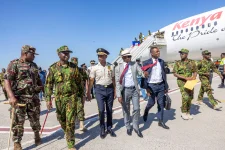US Freezes $13 Million for Haiti Security Mission Led by Kenya.
The United Nations reported Tuesday that the United States has halted $13.3 million in funding for the multinational security mission in Haiti. This move follows President Donald Trump's 90-day pause on foreign aid.
"The US had committed $15 million to the trust fund; $1.7 million of that had been spent," UN spokesperson Stephane Dujarric said. The US government sent an official notice asking for an immediate stop to work funded by their contribution.
The mission includes nearly 900 police and troops from Kenya, El Salvador, Jamaica, Guatemala, and Belize. Canada leads donor support, contributing over half of the $110 million paid into the UN trust fund.
Trump ordered the aid review on January 20, his first day in office. The pause aims to assess if foreign assistance matches his "America First" policy goals.
The freeze has impacted Haiti severely. Local clinics offering HIV/AIDS treatment have closed, and security advisers supporting both Haiti's police and the Kenya-led mission lost their jobs, the Miami Herald reported.
US Secretary of State Marco Rubio praised Kenya's leadership during his Senate confirmation hearing. Yet neither he nor Trump has pledged continued financial support for the operation.
Haiti faces deepening problems. Armed gangs took control of record numbers of Port-au-Prince neighborhoods last year. UN data shows gang violence killed more than 5,600 people, forcing over one million Haitians from their homes.
The multinational force remains understaffed, operating with fewer than half its planned 2,500 personnel. On Tuesday, 70 Salvadoran soldiers arrived in Port-au-Prince as aviation specialists for medical evacuations.
Kenya promised 1,000 police officers to lead the mission. The operation depends on voluntary donations, but many countries hesitate to contribute, citing donor exhaustion.
Decades of political turmoil, authoritarian rule, and natural disasters have made Haiti the poorest nation in the Americas. Recent gang violence and mass displacement have worsened the country's humanitarian emergency.
The United Nations reported Tuesday that the United States has halted $13.3 million in funding for the multinational security mission in Haiti. This move follows President Donald Trump's 90-day pause on foreign aid.
"The US had committed $15 million to the trust fund; $1.7 million of that had been spent," UN spokesperson Stephane Dujarric said. The US government sent an official notice asking for an immediate stop to work funded by their contribution.
The mission includes nearly 900 police and troops from Kenya, El Salvador, Jamaica, Guatemala, and Belize. Canada leads donor support, contributing over half of the $110 million paid into the UN trust fund.
Trump ordered the aid review on January 20, his first day in office. The pause aims to assess if foreign assistance matches his "America First" policy goals.
The freeze has impacted Haiti severely. Local clinics offering HIV/AIDS treatment have closed, and security advisers supporting both Haiti's police and the Kenya-led mission lost their jobs, the Miami Herald reported.
US Secretary of State Marco Rubio praised Kenya's leadership during his Senate confirmation hearing. Yet neither he nor Trump has pledged continued financial support for the operation.
Haiti faces deepening problems. Armed gangs took control of record numbers of Port-au-Prince neighborhoods last year. UN data shows gang violence killed more than 5,600 people, forcing over one million Haitians from their homes.
The multinational force remains understaffed, operating with fewer than half its planned 2,500 personnel. On Tuesday, 70 Salvadoran soldiers arrived in Port-au-Prince as aviation specialists for medical evacuations.
Kenya promised 1,000 police officers to lead the mission. The operation depends on voluntary donations, but many countries hesitate to contribute, citing donor exhaustion.
Decades of political turmoil, authoritarian rule, and natural disasters have made Haiti the poorest nation in the Americas. Recent gang violence and mass displacement have worsened the country's humanitarian emergency.












